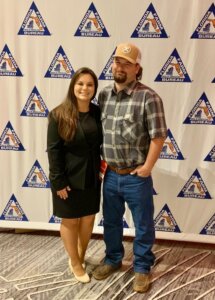April 2024 FloridAgriculture eNewsletter
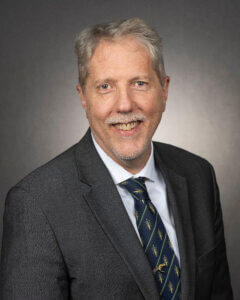
By Rob Gilbert
[email protected]
@IFAS_VP
Vivek Sharma has grant money, soil moisture probes, a lab, brilliant graduate students, and the full backing of a UF/IFAS faculty appointment to figure out how to get maximum yield with minimal environmental impact.
Gilchrist County Farm Bureau board member BJ Wilkerson he’ll have about 40 harvests in his lifetime and a young daughter interested in farming to figure out the same thing.
Sharma develops the science that underpins best management practices. Wilkerson makes changes to his practices based on observation, and thanks, to UF/IFAS, increasingly based on consultation with his daughter.
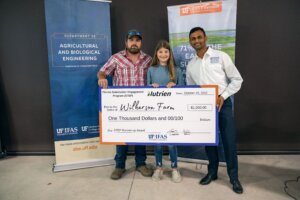 Sharma and the Wilkersons’ combined expertise has developed a better understanding of what works for corn. Their partnership exemplifies UF/IFAS and Florida Farm Bureau’s decades-long cooperation.
Sharma and the Wilkersons’ combined expertise has developed a better understanding of what works for corn. Their partnership exemplifies UF/IFAS and Florida Farm Bureau’s decades-long cooperation.
We even jointly throw a party to highlight the farmers who demonstrate their environmental stewardship through best management practices, or BMPs. The Farm Bureau funds Suwannee CARES, and UF/IFAS hosts an awards night – this year on May 2 – at its North Florida Research and Education Center—Suwannee Valley (NFREC-SV) in Live Oak.
Improving water quality is one of Florida’s greatest challenges, but because of the partnership between UF/IFAS and the Florida Farm Bureau, it can also be one of our greatest scientific, environmental, and agricultural successes.
The Wilkerson family was recognized at Suwannee CARES in 2022 as one of those successes. And they’re looking to achieve even more with Sharma, NFREC-SV assistant center director Bob Hochmuth and Gilchrist County agriculture and natural resources Extension agent Tyler Pitman.
Hochmuth has run watermelon trials on Wilkerson’s farm in Trenton. Pitman is currently experimenting with controlled release fertilizers on Wilkerson’s land.
Two years ago, Sharma set up Florida Stakeholder Engagement Program (STEP) Corn Contest plots for 10 farmers at NFREC-SV, thanks to funding from the Florida Department of Agriculture and Consumer Services. He put out a call for participants. The idea was to do the farming for them as they directed and give them data and photos, and the farmers would respond with decisions on seeding rate, nitrogen management, irrigation, insurance selection and grain marketing.
Wilkerson was among those who heard from Sharma. At the time his daughter was telling Wilkerson she wanted to be a farmer just like her dad, grandfather, and great-grandfather. Wilkerson also wanted to do everything he could to protect the land and natural resources on which Kelsey would be depending 40 harvests from now.
They were one of winners of the competition and collected a $1,000 check as the top overall performers. You can guess who ultimately cashed it.
I’m excited to attend this year’s Suwannee CARES to hear more inspiring stories about how university-Farm Bureau-agency partnerships are using BMPs to protect water quality.
The scientist-grower partnership really hits home with me, because I came up through the ranks of UF/IFAS at the Everglades Research and Education Center. Scientists, growers, and agency officials working together there have used BMPs to reduce phosphorus runoff by 57 percent.
Farmers, of course, see themselves as environmental stewards. But they can’t build environmental stewardship into the price of their crop, and they can’t even convince some people that it’s part of their practices and ethic.
In that atmosphere, the daddy-daughter victory and the CARES award mean a lot to Wilkerson.
“We get put down a whole lot more than we get picked up,” Wilkerson says. “It’s nice to know at least somebody thinks we’re headed in the right direction.”
Rob Gilbert is the University of Florida’s interim senior vice president for agriculture and natural resources and leader of the UF Institute of Food and Agricultural Sciences (UF/IFAS).
 The Central Florida Regional Planning Council in conjunction with the Highlands Soil and Water Conservation District is hosting a Landowner Assistance Expo on Tuesday, June 11, 2024, from 8:30 a.m. – 2:00 p.m. It will be held at the Bert J. Harris Agricultural Center Auditorium at 4509 George Boulevard, Sebring, FL 33875.
The Central Florida Regional Planning Council in conjunction with the Highlands Soil and Water Conservation District is hosting a Landowner Assistance Expo on Tuesday, June 11, 2024, from 8:30 a.m. – 2:00 p.m. It will be held at the Bert J. Harris Agricultural Center Auditorium at 4509 George Boulevard, Sebring, FL 33875.
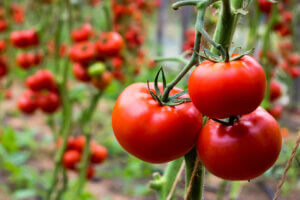 On April 18th, 2024, the U.S. Court of International Trade remanded a 2019 decision to the U.S. Department of Commerce (DOC), which determined Mexican tomatoes were being dumped in the U.S. market. This decision came as a result of a court case filed by a large Mexican tomato exporter.
On April 18th, 2024, the U.S. Court of International Trade remanded a 2019 decision to the U.S. Department of Commerce (DOC), which determined Mexican tomatoes were being dumped in the U.S. market. This decision came as a result of a court case filed by a large Mexican tomato exporter.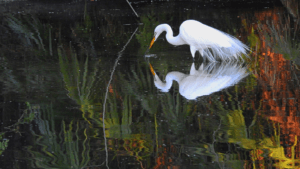 On February 15, 2024, the U.S. District Court for the District of Columbia issued an order that nullified the U.S. Environmental Protection Agency’s (EPA) approval of Florida’s application to take over permitting authority from the U.S. Army Corps of Engineers (USACE) under Section 404 of the Clean Water Act (CWA) within the state. The court’s decision was based on allegations that the federal defendants violated the Administrative Procedure Act (APA) and the Endangered Species Act (ESA) during the approval process, which occurred in the final days of the Trump administration.
On February 15, 2024, the U.S. District Court for the District of Columbia issued an order that nullified the U.S. Environmental Protection Agency’s (EPA) approval of Florida’s application to take over permitting authority from the U.S. Army Corps of Engineers (USACE) under Section 404 of the Clean Water Act (CWA) within the state. The court’s decision was based on allegations that the federal defendants violated the Administrative Procedure Act (APA) and the Endangered Species Act (ESA) during the approval process, which occurred in the final days of the Trump administration.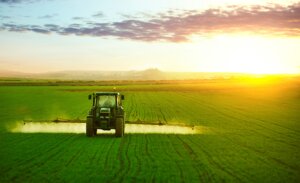 On April 2, the U.S. Environmental Protection Agency (EPA) announced changes to the pesticide labeling requirements of chlorpyrifos, diazinon, and malathion. Additionally, the EPA committed to issuing Endangered Species Protection Bulletins that set geographic limitations for these organophosphate insecticides, which will be available on Bulletins Live! Two.
On April 2, the U.S. Environmental Protection Agency (EPA) announced changes to the pesticide labeling requirements of chlorpyrifos, diazinon, and malathion. Additionally, the EPA committed to issuing Endangered Species Protection Bulletins that set geographic limitations for these organophosphate insecticides, which will be available on Bulletins Live! Two.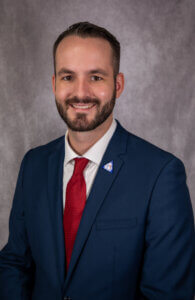

 Sharma and the Wilkersons’ combined expertise has developed a better understanding of what works for corn. Their partnership exemplifies
Sharma and the Wilkersons’ combined expertise has developed a better understanding of what works for corn. Their partnership exemplifies 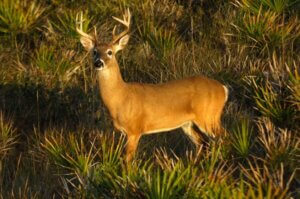 For the last decade, FFBF has been receiving complaints from our active membership in the Panhandle and surrounding counties about substantial crop losses due to deer depredation. These losses are a direct result from urban encroachment, forcing wildlife onto rural agricultural landscapes, poor management practices by the Florida Fish and Wildlife Conservation Commission (FWC), as well as strict rules implemented by FWC that disallow harvest rates and practices that help to manage a healthy and harmonious population of deer within the landscape.
For the last decade, FFBF has been receiving complaints from our active membership in the Panhandle and surrounding counties about substantial crop losses due to deer depredation. These losses are a direct result from urban encroachment, forcing wildlife onto rural agricultural landscapes, poor management practices by the Florida Fish and Wildlife Conservation Commission (FWC), as well as strict rules implemented by FWC that disallow harvest rates and practices that help to manage a healthy and harmonious population of deer within the landscape.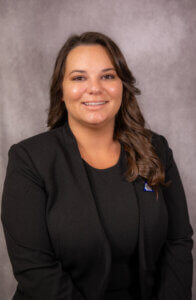 Dallas Hull grew up in New Smyrna Beach where she was involved in her local 4-H and FFA programs. Her father was a Volusia County Fair Association Director during Hull’s childhood, which led to her involvement showing livestock at the county fair. She has always been around agriculture in some facet, and over the last few years, has truly grown into a strong advocate and leader in her county.
Dallas Hull grew up in New Smyrna Beach where she was involved in her local 4-H and FFA programs. Her father was a Volusia County Fair Association Director during Hull’s childhood, which led to her involvement showing livestock at the county fair. She has always been around agriculture in some facet, and over the last few years, has truly grown into a strong advocate and leader in her county. 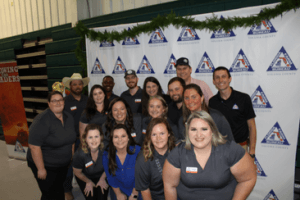 Taste of Volusia is a
Taste of Volusia is a 